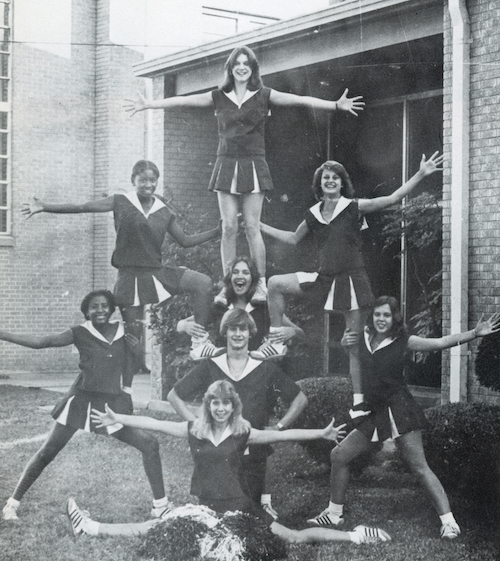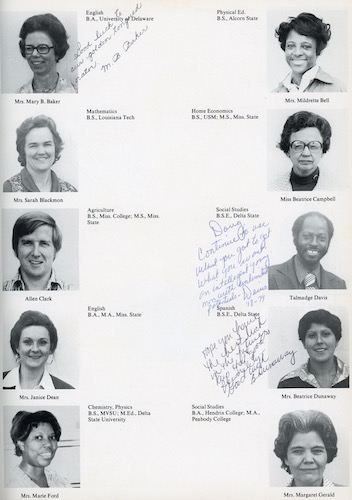Communiqué
A small Mississippi town integrated its public schools during the school year, “The Harvest” on AMERICAN EXPERIENCE – Sept. 12 at 9 pm
< < Back to a-small-mississippi-town-integrated-its-public-schools-during-the-school-year-the-harvest-on-american-experience-sept-12-at-9-pmAmerican Experience
“The Harvest”
Premieres Tuesday, September 12, 2023 at 9 pm on PBS and Streaming on PBS.org
Pulitzer Prize-winning Author Douglas Blackmon Explores His Experiences as Part of Leland, Mississippi’s First Integrated Public School Class in 1970
Pulitzer Prize-winning author Douglas A. Blackmon looks back on his experience as a member of the first class of Black and white children to attend all 12 grades together in Leland, Mississippi, in The Harvest, a new documentary that premieres on American Experience Tuesday, September 12, 2023, 9:00-11:00 p.m. ET on PBS, PBS.org and the PBS App. The film, produced by Blackmon and Sam Pollard and executive produced by Cameo George, is a deeply personal depiction of one Southern town’s painful struggle to integrate its public schools and the continuing repercussions still felt more than 50 years later. The film, part of a special two-night event exploring the legacy of school integration, will be preceded by The Busing Battleground, premiering September 11.

After the 1954 Supreme Court’s landmark Brown v. Board of Education decision ruled that racial segregation in public schools was unconstitutional, little more than token efforts were made to desegregate Southern schools. That changed dramatically on October 29, 1969, when the high court ordered Mississippi schools to fully — and immediately — desegregate. As a result, a group of children, including six-year-old Blackmon, entered school in the fall of 1970 as part of the first class of Black and white students who would attend all 12 grades together in Leland, Mississippi.
Set against vast historic and demographic changes unfolding across America, The Harvest steps back in time to explore Mississippi’s brutal history of racial intolerance and segregation — a world in which schools for Black children were not only separate but deeply underfunded, often inaccessible, and sometimes nonexistent.
The Harvest then follows the brave coalition of Black and white citizens who worked to create racially integrated public schools in the most unlikely place: a 1960s cotton town in the middle of the Mississippi Delta, the most rigidly segregated area in America. It tells the extraordinary story of how that first class became possible, then traces the lives of Blackmon and his classmates, teachers and parents through high school graduation in 1982. It is a riveting portrait of how those children’s lives were transformed and how the town — and America — were changed. But as the film follows the lives of those children into the present, it is also a portrait of what our society has lost in its failure to finish the work begun a generation ago.
Narrated by Blackmon and featuring candid interviews with his fellow pupils and others, the film follows the experiences of Blackmon’s class through school integration, deep friendships and awkward separations, in classrooms and on playgrounds, in plays and athletics, at homecoming and graduation. The film reveals that while many interracial friendships were formed in school, racial divisions often still existed outside the classroom.
 Moving into the present, The Harvest discovers that the success of those first years of integration has gradually fallen apart. In the 50 years since Douglas and his classmates began first grade, the local economy faltered and white families almost entirely abandoned public schools. And, as the schools once more became racially divided, the town’s racial divisions have deepened. But even amid those disappointments, many members of that first class have returned to Leland, committed to giving back to their community. Blackmon finds hope in the lives of his classmates, who have gone on to become the town’s police chief, a federal judge, an Army colonel, a high school deputy principal, and a school superintendent. Through the story of Leland, The Harvest paints a fascinating portrait of one town and one extraordinary class of students, and offers a timely look at the continuing challenges of racial division and education equity still facing America today.
Moving into the present, The Harvest discovers that the success of those first years of integration has gradually fallen apart. In the 50 years since Douglas and his classmates began first grade, the local economy faltered and white families almost entirely abandoned public schools. And, as the schools once more became racially divided, the town’s racial divisions have deepened. But even amid those disappointments, many members of that first class have returned to Leland, committed to giving back to their community. Blackmon finds hope in the lives of his classmates, who have gone on to become the town’s police chief, a federal judge, an Army colonel, a high school deputy principal, and a school superintendent. Through the story of Leland, The Harvest paints a fascinating portrait of one town and one extraordinary class of students, and offers a timely look at the continuing challenges of racial division and education equity still facing America today.
American Experience The Harvest will stream simultaneously with broadcast on all station-branded PBS platforms, including PBS.org and the PBS App, available on iOS, Android, Roku, Apple TV, Amazon Fire TV, Android TV, Samsung Smart TV, Chromecast and VIZIO. The film will also be available for streaming with closed captioning in English and Spanish.

